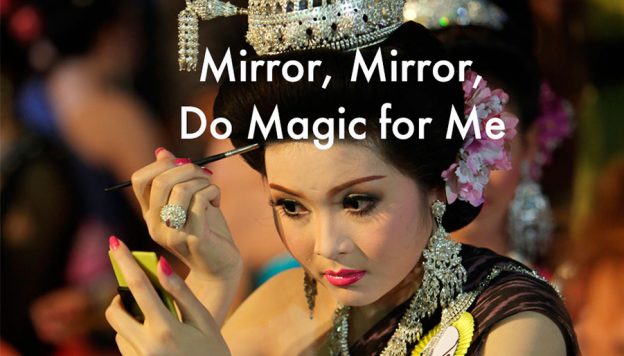Feng Shui does involve some common household items. But these items are generally not a major concern in Feng Shui. Nevertheless, one of these items has become famous – or notorious: the mirror.
Mirrors are things we use every day to make sure we are presentable before we leave home, and so on. For various reasons, however, many people have come to see them as important in Feng Shui.
In traditional folk practice, there is something called a Ba Gua Mirror, which is supposed to expel evil. This idea probably comes from the Taoist tradition, on which mirrors are regarded as “pure yang” objects, which can purify and expel evil.
Since Feng Shui has become popular in the United States, during the last century, it was mostly promoted by what is called the Black Hat school, which claims to follow Tibetan tradition – although that is a myth.
The Black Hat school often uses mirrors as a remedy – to expel bad energy, attract good energy, and even create a passageway through a blocking wall. Whenever there is a problem, there is a way to resolve it with a mirror. In this way, mirrors came to be seen as “the aspirin of Feng Shui”.
So what should we do with mirrors?
Let’s use common sense. One thing they can do is reflect more light. They can also create a feeling of a bigger space. But most important, they have practical uses: we can check our appearance to make sure we are presentable, we can look at our face or body for signs of medical problems, and so on.
But with every positive feature there is a negative side. For example, mirrors can create confusion, illusion, anxiety, and even provoke conflict.
In 1990, when I published my first Feng Shui book, The Fundamentals of Feng Shui, one of my students helped with the design and proof-reading. When I went to her house, I saw that everything was fine. I did notice that there was a lot of masculine energy in the house, so I asked her how come she was single, and living alone.
She said that, when she moved into that house, she was with her husband, but they started arguing more and more, until they broke up.
When I asked her that question, I was sitting at the kitchen table. This table leaned against a gridded mirrored wall. I asked her if that table was where she ate dinner with her husband, and if they argued a lot while sitting there.
She said that was exactly how it was – so I suggested that she remove the mirror, and paint the wall a neutral beige color. Later, when she finally did it, she told me that there was a big difference once the mirror was gone. I told her that she would have a boyfriend soon – and a year later, I received an invitation to her wedding.
In other words, that mirror, in that place, generated the conflict between her and her first husband. I can guarantee that if you sit with your best friend at a triangular table next to a wall-sized mirror, you will soon begin to fight.
When we bring a mirror into a house, we have to understand what purpose we are going to use it for. Is it necessary? Is it helpful? The basic rule for hanging a mirror is that you should be able to look at the mirror by choice.
All Dr. Hsu talks on Feng Shui


Dr. Hsu,
Good morning, i came across your work on feng sui when i was looking for a feng sui consultant. I live in WA, and wanted to know how can i keep in touch with you or your team because I really want my house to be seen by a feng sui expert.
Thank you.
Laarni
Dear Laarni,
Please contact Jenny Nakao Hones:
Address: Enumclaw, WA
Phone: (425) 444–3046
E-mail: jenny@asianlifestyledesign.com